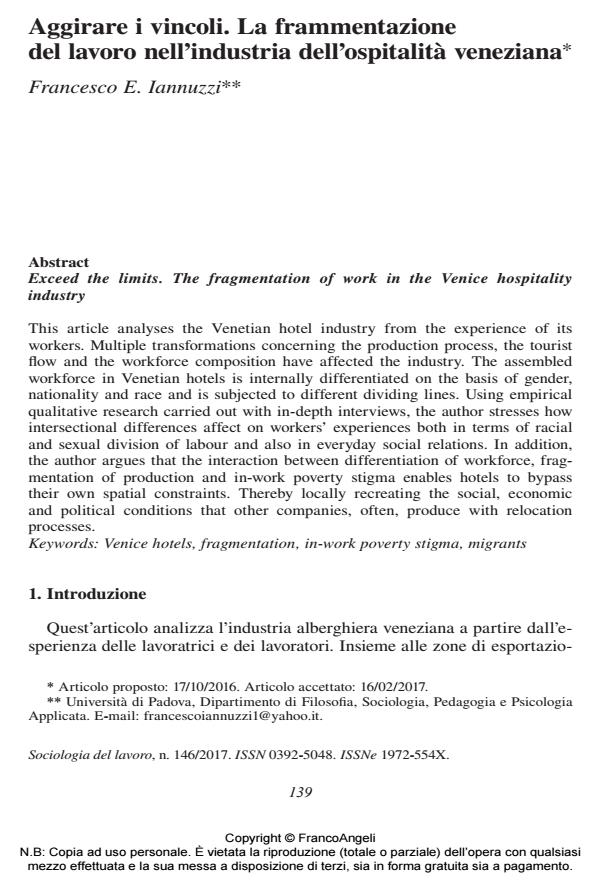Exceed the limits. The fragmentation of work in the Venice hospitality industry
Journal title SOCIOLOGIA DEL LAVORO
Author/s Francesco E. Iannuzzi
Publishing Year 2017 Issue 2017/146
Language Italian Pages 17 P. 139-155 File size 116 KB
DOI 10.3280/SL2017-146009
DOI is like a bar code for intellectual property: to have more infomation
click here
Below, you can see the article first page
If you want to buy this article in PDF format, you can do it, following the instructions to buy download credits

FrancoAngeli is member of Publishers International Linking Association, Inc (PILA), a not-for-profit association which run the CrossRef service enabling links to and from online scholarly content.
This article analyses the Venetian hotel industry from the experience of its workers. Multiple transformations concerning the production process, the tourist flow and the workforce composition have affected the industry. The assembled workforce in Venetian hotels is internally differentiated on the basis of gender, nationality and race and is subjected to different dividing lines. Using empirical qualitative research carried out with in-depth interviews, the author stresses how intersectional differences affect on workers’ experiences both in terms of racial and sexual division of labour and also in everyday social relations. In addition, the author argues that the interaction between differentiation of workforce, fragmentation of production and in-work poverty stigma enables hotels to bypass their own spatial constraints. Thereby locally recreating the social, economic and political conditions that other companies, often, produce with relocation processes.
Il saggio analizza l’industria alberghiera veneziana a partire dall’esperienza dei lavoratori. L’industria turistica è attraversata da molteplici trasformazioni che ri-guardano il processo produttivo, il flusso turistico e la composizione della forza lavoro. La manodopera assemblata dagli alberghi di Venezia è differenziata al suo interno sulla base del genere, della nazionalità e del colore della pelle ed è sottopo-sta a diverse linee di divisione interna. Utilizzando una ricerca empirica, condotta attraverso interviste in profondità, l’autore dimostra come le differenze intersezio-nali impattano sulle esperienze della forza lavoro sia in termini di divisione razziale e sessuale del lavoro sia sulle loro relazioni sociali quotidiane. Inoltre, l’autore sostiene che attraverso l’interazione tra differenziazione della manodopera, fram-mentazione della produzione e stigmatizzazione del lavoro povero, gli alberghi siano riusciti ad aggirare i propri vincoli spaziali ricreando in loco le condizioni sociali, economiche e di regolazione politica che altre aziende, spesso, ottengono attraverso la delocalizzazione.
Keywords: Venice hotels, fragmentation, in-work poverty stigma, migrants
- Seasonal work in the Italian tourism industry: a systematic literature review Fabio Gaspani, Silvia Mazzaglia, in Cambio. Rivista sulle Trasformazioni Sociali /2025 pp.17
DOI: 10.36253/cambio-16641 - Job quality and health conditions in the hotel industry: the case of housekeeping workers Fabio Gaspani, Sara Recchi, in International Review of Sociology /2024 pp.156
DOI: 10.1080/03906701.2024.2364175 - Tra regimi di diseguaglianze e mercati del lavoro transitori. Il lavoro negli alberghi di lusso a Parigi Gabriele Pinna, in SOCIOLOGIA DEL LAVORO 154/2019 pp.183
DOI: 10.3280/SL2019-154010
Francesco E. Iannuzzi, Aggirare i vincoli. La frammentazione del lavoro nell’industria dell’ospitalità veneziana in "SOCIOLOGIA DEL LAVORO " 146/2017, pp 139-155, DOI: 10.3280/SL2017-146009